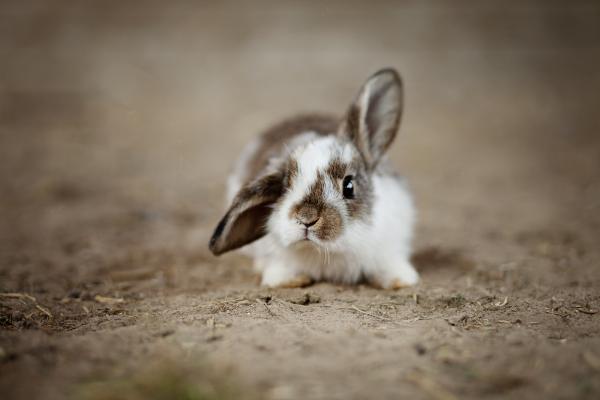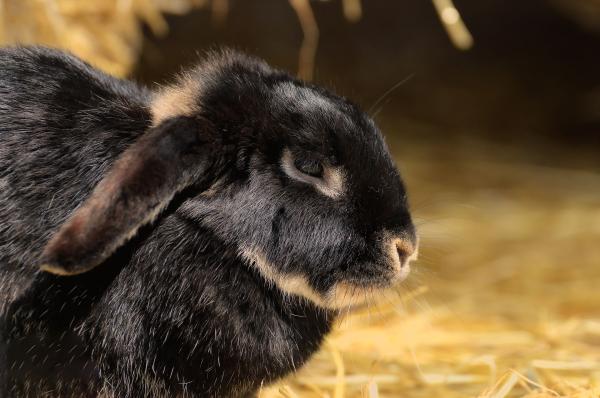
Those of us fortunate enough to share our lives with a rabbit will know they are sensitive animals. They may also know there are different breeds which have varying morphologies, i.e. their physical form differs. Some have naturally droopy ears, others have ears which stand alert. If we see our rabbit has one floppy ear, we may think it is simply their appearance. In some cases, it can be the signal of a health problem, especially if it appears suddenly.
At AnimalWised, we look at what happens when your rabbit has one floppy ear. We examine the possible diseases which might list this as a symptom, as well as what rabbit ear positions mean as signals for communication. If there is a disease, we also look at what treatment options might be available once you take them to a veterinarian.
Rabbit ear positions and their meanings
Firstly, it is important to remember that a rabbit may have naturally floppy ears. Moreover, they might naturally have one ear which is erect and another which droops down. There is a key distinction to make from the beginning. If you are asking why your baby rabbit's ears are floppy, this is to do with their development. A baby rabbit's ears will usually take between 9 and 13 days to stand erect.
However, if your baby rabbit's ears remain floppy after this time, it may not be due to a problem. It may be due to genetics. The way a rabbit's ears stand up or lop down will be one of these categories:
- Erect: the majority of rabbit breeds have both ears standing up once they develop.
- Full lop ears: although not as common as two erect ears, lop rabbit breeds are becoming increasingly popular as companion animals[1].
- Half lop ears: even when fully developed, the rabbit has one ear erect and one floppy.
- Oar lop ears: the ears of the rabbit stick out from the side of the rabbit's head and remain in a half-raised position.
- Horn lop ears: the ears are in a half-lop and project over the rabbit's face like bull horns.
Erect ears are the most common, but many lop rabbit breeds are starting to become more popular. These lop-eared bunny breeds are still relatively rare. If the reason for a rabbit's floppy ears is not genetic, we should look at other reasons for rabbit ear drooping.
One of the most important has to do with rabbit communication. While they can vocalize certain sounds, rabbits most commonly with their body language, either to other rabbits or animals of a different species. Ear movement is key in their communication.
It is common to see a rabbit with a twitching ear. This could be because they are alert to something in their environment or they are trying to signal to another rabbit. In general, when a rabbit's ears are down completely, the are relaxed and feeling secure (although this is not always the case with lop-eared rabbit breeds). When the ears are erect, it could be due to fear or even trying to get attention from their guardians.
Symptoms of a sick rabbit
If we fear our rabbit may be sick, there are various signs we need to be careful and look out for. Drooping ears in the rabbit may be one such symptom. If we are at all unsure, we need to take the rabbit to a veterinarian for examination and diagnosis. However, there are also symptoms of disease in rabbits which we can look out for, other than ear position.
- Apathy and lethargy: the rabbit does not want to move or performs usual actions more slowly and with reduced energy.
- Weight and appetite loss: if we detect the rabbit has severely altered their food intake or they have stopped eating completely, it may be due to a pathology that causes pain or discomfort.
- Gastrointestinal disorders: while digestive disorders can be of varying degrees of acuteness, diarrhea or constipation infer there is a health problem in the rabbit.
- Respiratory distress: if we see our rabbit is hyperventilating, with strong and very frequent breaths, it is a sign of a health problem.
- Skin abnormalities: presence of bruises, wounds, rashes, lumps or eczema on the skin of any part of the body.
- Abnormal temperature: fever or hypothermia.
- Watery or red eyes: with or without secretions of mucus.
- Ear droop: one or both ears are always bent or tilted to one side when they are normally erect.
- Poor gait: when a rabbit cannot stand properly, falls over when they hop or have some other problem with their movement, there is likely a health problem at fault.
Many of these symptoms are shared by various pathologies, meaning accurate diagnosis is essential. To help you know what you might expect, check out our article on the most frequent diseases in rabbits.

My rabbit has one ear up and one ear down
While we stated above the reasons why a healthy rabbit may have one floppy ear, it is also a possible sign of a health problem in rabbits. The main diseases which cause a rabbit's ear to droop are:
- Otitis: the most common cause of the rabbit having one droopy ear. It is an ear infection that can be caused by many factors, something we analyze further in the next section. When only one ear is affected, it is considered unilateral. This is the most common.
- Shope papilloma virus: while relatively rare, this type of virus affects the DNA of the rabbit and leads to keratinous growths which emerge mainly from the rabbit's head, often beginning with one ear drooping more than the other.
- Ringworm: not actually a type of worm, ringworm is caused by fungi such as Trichophyton mentagrophytes. As a fungal disease, antifungal medication is normally used to treat the problem.
Other causes of droopy ear in rabbits
While pathologies may be the root cause of a rabbit having one erect and one droopy ear, there are other reasons for this phenomenon. Physical trauma might result in the ears falling down, for example. It is even possible for emotional trauma to result in droopy ears. Any lesion or wound seen on the skin will need to be addressed as it can promote secondary bacterial infection. Since a rabbit's ears are very sensitive, it is imperative we pay special attention to their care.

Types of otitis in rabbits
Otitis is one of the most frequent health problems in rabbits. This is because it has various causes. Otitis is itself an inflammation of the auditory canal and is the most common reason for a rabbit having one floppy ear. Here are the most common causes of otitis in rabbits:
Mites on the ears of rabbits
In this case, the mite that most frequently causes problems in lagomorphs is Psoroptes cuniculi. This mite infects the inside of the rabbit's ears, causing a scabies-like condition. A brown discharge hardens and forms a scab, causing the rabbit to scratch the area. This scratching leads to wounds developing on the skin of the ear.
Mites are treated the same as mange in rabbits, with medications such as ivermectin or selamectin. These are also frequently used parasiticides in cats and dogs.
Bacterial infection
In these cases, otitis is caused by various bacteria such as Pasteurella multicida. This bacterium also affects the nose and pharynx. Since the nasal sinuses and those in the ear are connected, it is possible one area is affected first and it spreads to another. If not treated, bacterial otitis can become chronic. Treatment will require antibiotics specific to the type of bacteria which causes the rabbit ear infection.
Infection due to the presence of foreign bodies
If a foreign body has entered the animal's ear, the area can become inflamed. Foreign objects could be just about anything, but splinters and other detritus are most common. The swelling will likely be accompanied by itching, discomfort and/or pain. When the infection becomes sufficiently advanced, we should not hesitate and go to the veterinarian immediately.
Fungal infection in rabbits
High humidity and warm temperatures create conducive environments for fungal infections in rabbits. Fungi often proliferate in the auditory canal. This can best be prevented by keeping the ear dry and preventing the build-up of wax. To prevent this from happening, you will need to ensure your rabbit's ears are regularly cleaned.
Rabbit allergies
Similar to humans, a rabbit can have allergies to food, medication or material in their environment. In these cases, the immune response can be seen in other parts of the body, but a droopy ear will be one of the most obvious signs. Treatment involves going to the veterinarian to determine the allergy type and avoiding it in the future.
As you can see, there are many reasons a bunny has one floppy ear. Prevention is better than treatment, something which requires more than basic care needs. Watch our complete rabbit care guide below to learn more about ensuring your rabbit's general health and well-being:

This article is purely informative. AnimalWised does not have the authority to prescribe any veterinary treatment or create a diagnosis. We invite you to take your pet to the veterinarian if they are suffering from any condition or pain.
If you want to read similar articles to My Rabbit Has One Floppy Ear, we recommend you visit our Other health problems category.
1. Harvey, N. D., et al. (2019). What Makes a Rabbit Cute? Preference for Rabbit Faces Differs according to Skull Morphology and Demographic Factors. Animals, 9, 728.
https://www.mdpi.com/2076-2615/9/10/728
- Ecured. (n.d.). Common diseases in rabbits. Retrieved from: https://www.ecured.cu/Enfermedades_comunes_de_los_conejos
- Pet Info. (2015). Conditions in the ears of rabbits. Retrieved from: https://infomascota.com/afecciones-en-las-orejas-de-los-conejos/
- Mammals Parada-sphynx. (2016). Otitis in rabbits. Retrieved from: https://mamiferos.paradais-sphynx.com/mascotas/otitis-en-conejos.htm#cuales-son-las-casas-que-provocan-otitis-en-conejos